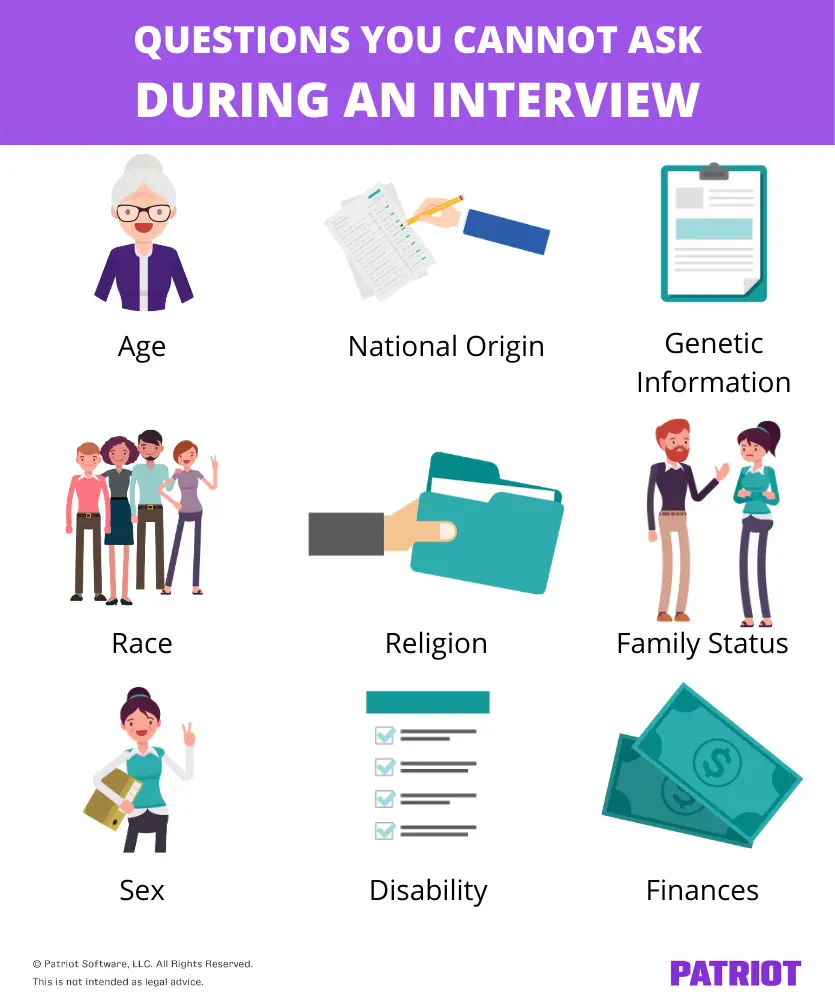On the hunt for new talent? Great! But when it comes to the hiring process, there are quite a few things you need to keep in mind. One of those things includes questions you cannot ask during an interview.
The last thing you want is for your interview process to offend candidates, tarnish your small business reputation, or become weighed down with a discrimination lawsuit.
So, what are illegal questions to ask in an interview? Read on to learn what types of things you cannot ask in an interview.
Laws that prohibit certain interview questions
As a small business owner, you must be mindful of federal and state laws against discrimination in the workplace. These laws protect both candidates and employees.
So, what are they?
The Equal Employment Opportunity Commission (EEOC) enforces federal laws that prohibit discrimination. These laws include the:
- Equal Pay Act of 1963
- Civil Rights Act of 1964
- Age Discrimination in Employment Act of 1967 (ADEA)
- Americans with Disabilities Act of 1990 (ADA)
- Civil Rights Act of 1991
- Genetic Information Nondiscrimination Act of 2008 (GINA)
Another federal law that protects individuals is the:
- Fair Credit Reporting Act (FCRA)
Some states also enforce further protections for workers against discrimination, including:
- Salary history laws by state
- Ban-the-box laws by state
- Equal pay laws by state
Not all employers are required to follow each of these laws. The Civil Rights Act, ADA, and GINA only apply to employers with 15 or more employees. And, the ADEA only applies to employers with 20 or more employees. Make sure to check with your state for specifics on state discrimination laws.
You might be wondering how these laws relate to interview questions. Depending on what you ask, you may violate one of the laws prohibiting job discrimination.
The questions you can’t ask in an interview could produce answers that result—or look like they result—in candidate discrimination. As an interviewer, you cannot violate workers’ privacy or anti-discrimination rights.
Questions you cannot ask during an interview
Now that you’re familiar with the laws that determine which questions you cannot ask during an interview, take a look at the topics themselves.
So, what are illegal questions to ask in an interview? Do not ask candidates questions relating to their:
- Age
- Race
- Sex
- National origin
- Religion
- Disability
- Genetic information
- Family status
- Finances
- Previous salary (if applicable)
- Criminal history (if applicable)

Age
Employers cannot discriminate against an applicant or employee due to their age. The Age Discrimination in Employment Act of 1967 protects individuals who are 40 or older from age discrimination.
Here are a few questions related to age you should not ask candidates:
- How old are you?
- When did you graduate from high school?
- In how many years do you think you’ll retire?
- We have a younger work culture here. Will that be an issue for you?
You can, however, ask candidates whether they’re older than the minimum age requirement for work under the FLSA’s child labor laws and in your state.
Race
The Civil Rights Act of 1964 protects individuals from discrimination based on race or color. Employers cannot make hiring decisions based on a candidate’s race.
Do not ask candidates race-related questions such as:
- What’s your racial identity?
- What ethnicity are you?
Sex
Under the Civil Rights Act of 1964, employers cannot discriminate against individuals based on sex or gender. The Equal Pay Act of 1963 also protects men and women to prevent wage discrimination.
Do not ask applicants questions like the following examples:
- Are you pregnant?
- Do you plan on having a family?
- What is your sexual orientation?
- Are you comfortable being one of the only women/men here?
National origin
The Civil Rights Act of 1964 protects individuals from employment discrimination based on national origin.
Under this law, employers cannot discriminate against a candidate based on where they or someone they know (e.g., a spouse) is from.
Country of origin-related questions you cannot ask during an interview include:
- Where are you from?
- What’s your first language?
- Where are your parents from?
Keep in mind that you must have new hires fill out Form I-9, Employment Eligibility Verification, to verify they are legally allowed to work in the United States.
Religion
The Civil Rights Act of 1964 protects individuals from religious discrimination in the workplace.
Do not ask candidates questions about their religion, such as:
- What religion are you?
- What are your religious beliefs?
- Do you need time off for religious holidays?
- Where do you go to church?
Disability
ADA guidelines ensure individuals with disabilities have equal rights in the workplace. Employers cannot discriminate against qualified candidates with disabilities during the hiring process.
Here are a few disability-related questions you cannot ask during an interview:
- Do you have a physical or mental disability?
- How did you become disabled?
- What types of conditions could impact your ability to do this job?
- Have you ever filed a worker’s compensation claim?
Again, do not ask candidates about any disabilities they may have. However, you can ask an applicant whether they need a reasonable accommodation (e.g., frequent breaks).
Genetic information
The Genetic Information Nondiscrimination Act of 2008 protects individuals from employment discrimination based on their genetic information (e.g., family medical history).
Take a look at some of the questions you should avoid asking candidates:
- How is your health?
- Do you have a family medical history of something that could inhibit your ability to do this job?
- Would you be willing to take a pre-employment genetic screening?
Family status
Although you may want to get to know a little bit about an employee’s personal life, you should not ask personal questions about their family.
What are illegal interview questions to avoid relating to family status? Here are a few:
- Are you married?
- Do you have kids?
Instead, you can say things like Tell me a little bit about yourself to learn more about a candidate.
Finances
The Fair Credit Reporting Act protects consumer credit information and regulates who can access it. Although you may obtain credit-related information while conducting a background check, you must get the candidate’s permission.
Do not ask candidates questions about their finances during an interview. Probing a candidate for information about their personal finances is never appropriate. Avoid asking questions like:
- Do you have any debt?
- Have you ever filed for bankruptcy?
- Do you have any wage garnishments?
Previous salary
Salary history laws prevent employers from asking candidates about their salaries at previous places of employment. These laws are in place to promote equal pay in the workplace and close the wage gap.
There is no federal law that bans employers from asking how much a candidate makes or made. However, there are seven states with salary history bans that affect all employers. California, Connecticut, Delaware, Hawaii, Massachusetts, Oregon, and Vermont ban salary history questions.
If your business is in a state with a salary history law, you cannot ask questions like:
- What is your current salary?
- How much did you make at your previous jobs?
Some employers ask salary history questions so they can make a fair compensation offer to candidates. Instead of asking salary history questions, you can ask applicants about their salary expectations.
Criminal history
You might be curious about a candidate’s past. As an employer, you have a responsibility to do your due diligence during the background check to learn everything you can about a candidate.
But, you cannot pry into an applicant’s criminal history during the pre-employment questionnaire or interview process in some states.
A number of states and Washington D.C. have ban-the-box laws that prevent employers from asking candidates criminal history questions until after the interview or a conditional job offer.
California, Colorado, Connecticut, Hawaii, Illinois, Massachusetts, Minnesota, New Jersey, New Mexico, Oregon, Rhode Island, Vermont, and Washington all have ban-the-box laws that impact private employers.
Here are some examples of questions you can’t ask in an interview about criminal history:
- Have you ever been convicted of a crime?
- Why did you commit a crime?
- How many speeding tickets do you have?
Ready to extend a job offer to a candidate? Once you hire a new employee, you can’t forget to update your payroll. Patriot’s payroll software lets you run payroll using an easy three-step process. Plus, we offer free, U.S.-based setup and support. Get your free trial now!
This is not intended as legal advice; for more information, please click here.


